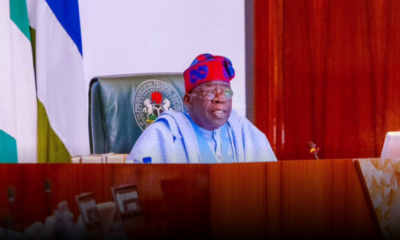Economic experts have expressed support for President Bola Ahemd Tinubu’s plan to unify the nation’s foreign exchange rates and reduce interest/lending rates.
The experts also threw their weight behind Tinubu’s announcement at his inauguration yesterday that the era of subsidy payments on fuel was over.
The experts are Prof. Uche Uwaleke of the Department of Economics, Nasarawa State University, Keffi, Chief Executive Officer, Centre for the Promotion of Private Enterprise [CPPE], Dr Muda Yusuf and the Managing Director/CEO of SD&D Capital Management Limited, Gbolade Idakolo.
According to the economists, a single exchange rate regime will restore sanity to the foreign exchange market and consequently strengthen the Naira.
However, Managing Director/CEO of Economic Associates, Dr Ayo Teriba, argued that the pronouncement by the President on forex rates convergence could only be dissected when he (Tinubu) announces “how he wants to carry out the plan.”
Uwaleke said “The unification of exchange rates will discourage round-tripping and make the forex market more transparent, which in turn supports a conducive environment for foreign investment and capital inflows.
He called on the Central Bank of Nigeria(CBN” “to pause policy rate hikes,” saying, “it has not been effective in taming inflation.
“Lower interest rates will no doubt improve access to credit for SMEs and stimulate output and jobs,” the professor of Economist argued.
Yusuf, who praised the plan by Tinubu, however, said there is a need to clarify that the unification move was not a devaluation of the naira proposition but ”a pricing mechanism that reflects the demand and supply fundamentals in the foreign exchange market which allow for rate adjustments as and when necessary.
“It is a model that is predictable, transparent and sustainable. It is a policy regime that would reduce uncertainty and inspire the confidence of investors. It is a policy framework that would minimise discretion and arbitrage in the foreign exchange allocation mechanism,” Yusuf said in a statement.
He pointed out that a unified exchange rate regime offers a number of benefits for the economy, including improved liquidity in the foreign exchange market, reduced uncertainty in the same market and improved investor confidence.
Other benefits listed by the expert are transparent forex allocation, minimal discretion in the allocation of forex and reduction of opportunities for round-tripping and other sharp practices.
Yusuf said the current foreign exchange policy regime on the other hand creates multiple exchange rates that result in distortions and negative outcomes.
The CPPE also said that about N7 trillion would be unlocked into the Federation Account through the removal of fuel subsidy, adding that this would reduce fiscal deficit and ultimately ease the burden of mounting debt.
His words: “Fuel subsidy removal has enormous potential benefits. First, there is the revenue effect. The removal would unlock about N7 trillion into the federation account. This would reduce fiscal deficit and ultimately ease the burden of mounting debt.
“Second, is the investment effect. Currently, it is extremely difficult to attract private investment into our petroleum downstream sector because of the unsustainable subsidy regime and the stifling regulatory environment.
“The subsidy removal will eliminate the distortions and stimulate investment. We would see more private investments in petroleum refineries, petrochemicals and fertiliser plants. Post-subsidy regime would also unlock investments in pipelines, storage facilities, transportation and retail outlets.
“We would see the export of refined petroleum products petrochemicals and fertiliser as private capital comes into the space. Quality jobs will be created.
“Also, there is a foreign exchange effect. This would result from the import substitution as petroleum products importation progressively declines. This would conserve foreign exchange and boost our external reserves.
“Increase in investment would translate into more jobs in the petroleum downstream sector. Smuggling of petroleum products across the borders will come to an end with a market pricing of refined products.”
However, the CPPE boss advised that the government needed to immediately put in place palliatives to cushion the adverse effect the removal would have on the people.
These palliatives, according to him, should be segmented into immediate, short term and medium-term deliverables.
“Immediate and short-term options include the introduction of subsidised public transportation schemes across the country and reduction in import duties on intermediate products for food-related production to moderate food inflation.
“In the medium to long-term, there should be accelerated efforts to upscale domestic refining capacity, driven by private investments; accelerated investments in rail transportation by the government to ease logistics of fuel distribution across the country as well as domestic freight costs,” Yusuf said.
On his part, Idakolo agreed that there was a need for convergence of the exchange rates. He pointed out that multiple exchange rates have not only been manipulated but have served as “a business for some people.”
Idakolo also said if the government and the CBN were able to keep interest rates down, Nigerians would start feeling the positive effects of the decision in about six months to one year.
He said: “The way things are going now, if we go ahead as the new president has said, in the next six months to one year, we will begin to see the difference, despite the continual increase in the interest rate, inflation still did not go down.

 BIG STORY3 days ago
BIG STORY3 days ago
 BIG STORY4 days ago
BIG STORY4 days ago
 BIG STORY3 days ago
BIG STORY3 days ago
 BIG STORY5 days ago
BIG STORY5 days ago
 BIG STORY16 hours ago
BIG STORY16 hours ago
 BIG STORY4 days ago
BIG STORY4 days ago
 BIG STORY2 days ago
BIG STORY2 days ago
 BIG STORY3 days ago
BIG STORY3 days ago






















